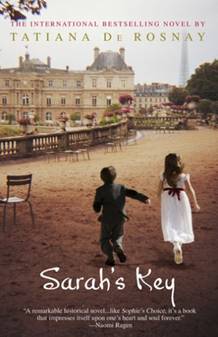
Last issue, I reviewed “Purple Hibiscus” by Chimamanda Adichie, a work which proved to be that elusive school assigned reading novel that doesn’t bore students into a coma. Its feminist values and urging to “challenge the man,” as it were, are exactly the kind of thing I enjoy in literature and make for a very inspiring read.
As this is my last article for this column (?), I decided to review a book I had already read and could give positive feedback on because I would hate to leave you with a Kong’s Korner-esque rant. “Sarah’s Key” by Tatiana de Rosnay is an extremely moving novel about the Holocaust in France and is one of those rare stories that has the potential to stay with the readers for the rest of their lives.
The only reason I picked up “Sarah’s Key” in the first place was that there is a testimonial on the front cover by Augusten Burroughs, one of my favorite writers of all time. I figured if he had anything good to say about the novel, it must be worth reading; and it was. But it was good in that tear your beating heart out and rip it into thousands of pieces kind of way. I have no doubt in my mind that even the manliest of men on this planet would bawl the way yours truly did after completing the book.
“Sarah’s Key” follows two plotlines: one of a Jewish girl called Sarah who was arrested during the Vel’ d’Hiv Roundup in Paris, and the other of Julia, a journalist who is writing an article on the roundup 60 years later. The beginning of the novel consists mostly of narrations by Sarah, with some chapters jumping to the present in Julia’s voice. As the book progresses, so does Sarah’s story, until it ends abruptly and the reader is left only with Julia’s chapters of investigative journalism to discover Sarah’s fate.
The film adaptation of “Sarah’s Key” as directed by Gilles Paquet-Brenner is equally brilliant and stays true to De Rosnay’s style. It’s almost more heart wrenching than the actual novel, if that’s even possible. Whether through film or the pages of the book, the message and the story is the same. This brutal historic event, as well as so many others, cannot be forgotten. Their repercussions are felt even today. As Julia says, “We’re all a product of our history.”


